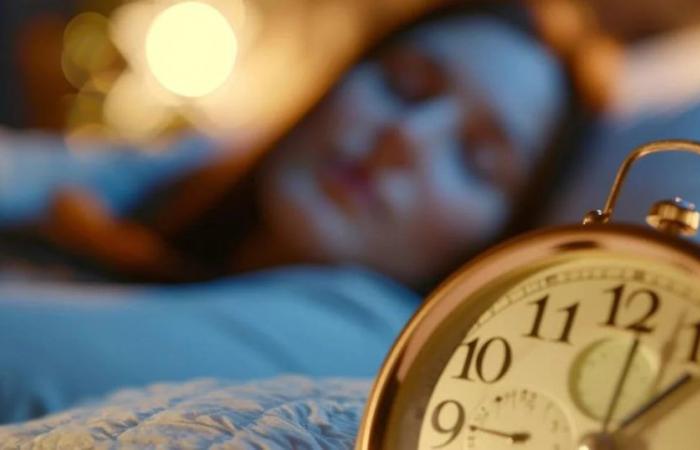In the community of those they study sleep of human beingsis known as “owl” to people who tend to stay up until very late. The term is derived from the nocturnal habits of these birds, which can hunt in the dark.
New research by scientists from the Stanford University in the United States revealed that following the natural inclination to stay awake until the wee hours of the morning may be a poor choice for mental health. The study was published in the journal Psychiatry Researchrecommends turn off the lights before 1 a.m..
Last year another study had found that night owls had a higher risk of diabetes. Now, in a survey carried out on almost 75,000 adultsresearchers compared participants’ preferred sleep schedule, known as chronotype, with their actual sleep behavior.

Regardless of your preferred bedtime, Researchers found that it is better for everyone to go to bed early.
Both morning larks (as people who wake up early are called) like night owls They tended to have higher rates of mental and behavioral disorders if they stayed up late.
“We found that alignment with chronotype is not crucial in this case and that, in fact, staying up late It’s not good for mental health. The question is why,” he said. Jamie Zeitzerprofessor of psychiatry and behavioral sciences and senior author of the study.
An earlier study by Zeitzer’s team had suggested that women with cancer Those who slept against their chronotype had a shorter life expectancy. “There is a lot of data that indicates that living according to your chronotype is very important. That was our expectation,” she commented.
The researchers set out to study alignment with chronotype in a broader population. They looked at middle-aged and older adults in the United Kingdom, asking them about their sleep, including their preference for morning or evening sleep.

They were sent a portable accelerometer (basically a fancy activity tracker, according to Zeitzer) to track your sleep for seven days. The mental health of the participants was determined through their medical records. The researchers took into account any mental or behavioral disorders included in the International Classification of Diseases.
Of the 73,880 participants, 19,065 self-identified as morning people, 6,844 as afternoon people, and 47,979 as intermediate people.
Their sleep behavior was evaluated in relation to the entire group. It was considered that 25% of the former slept early, 25% of the latter slept late, and 50% of the latter had intermediate sleep.
Categorizing sleep behavior this way, Zeitzer explained, rather than by specific bedtimes, is more meaningful because different populations may have different sleep norms.

When the researchers analyzed the data, they were surprised to discover that align with the chronotype each It was not the best option for mental health of everyone.
The results were clear: both those who went to bed late in the morning and those who went to bed at night had higher rates of mental disorders, such as depression and anxiety.
“The worst case scenario is, without a doubt, that of night owls who go to bed late”Zeitzer highlighted. Night owls true to their chronotype were 20% to 40% more likely to be diagnosed with a mental disorder, compared to night owls who followed an early or intermediate sleep schedule.
Night owls who followed an earlier schedule fared better. The morning ones that followed a later schedule suffered, but not too much.

The morning larks that they rose with the sun they used to have the better mental health of all, to everyone’s surprise.
The researchers found that sleep duration and consistency of sleep schedule could not explain these differences in mental health. They also tested the possibility that it was the Poor mental health caused people to stay up late, not the other way around. They followed a subset of participants with no prior diagnosis of mental disorder for the next eight years.
During that time, night owls who stayed up late were the most likely to develop a mental disorder.
There may be many explanations for the relationship between sleep time and mental well-being, but Zeitzer believes it is probably due to the bad decisions that people drink in the wee hours of the morning.

Many harmful behaviors are more frequent at night, such as suicidal thoughts, violent crimes, alcohol and drug use, and overeating.
A theory, known as the “mind after midnight”, suggests that neurological and physiological changes late at night may promote impulsivenessthe state of negative mood, impaired judgment and increased risk taking.
Another explanation could be a social mismatch with the dominant chronotype. “Maybe there is fewer social limitations late at night because there are fewer people awake,” Zeitzer said.
Although Zeitzer He advises night owls to go to bed before 1 a.m., knowing that this is easier said than done. Getting sun in the morning and following an earlier routine every day of the week could change sleep patterns, but the chronotype does not change.

“From a biological point of view, it’s a lot like a rubber band: you take a day off and you go back to the point where your body wants to be,” he explains.
His team plans to examine whether certain nighttime behaviors, rather than the schedule itself, are linked to poor mental health.
In dialogue with Infobaethe doctor Daniel Cardinaliexpert in neurosciences and sleep and professor emeritus of the Buenos Aires’ University, commented on the study published by Stanford researchers: “It is interesting research. “It suggests that people with a morning preference who go to bed early tend to have better mental health than morning people who go to bed late.”
Also mentioned by Cardinali, it is observed that people with a nocturnal preference who sleep late have worse mental health. That is to say, Early risers have an advantage.






